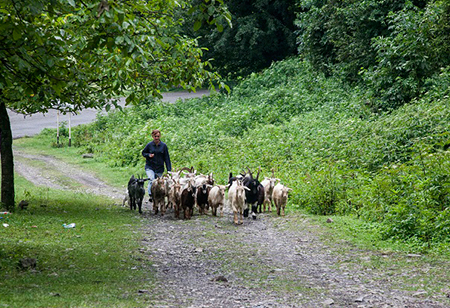Mountain Law: Benefits for Georgia’s alpine population in 2016

People living in Georgia’s mountain areas will enjoy the first part of a benefits scheme on January 1, 2016 when the new mountain law comes into force.
Parliament of Georgia adopted a new law on Development of Mountainous Regions last month, which aimed to encourage people to live and work in the country’s mountainous regions.
The second part of the law will be enforced on September 1, 2016 and the last part will come into play on January 1, 2017.
Current trends showed people often left their homes in the mountains to pursue a career in larger villages or cities however the Georgian authorities noted this was not conducive as it left many mountain areas barely inhabited.
Latest figures from 2002 revealed 164 villages in Georgia were deserted and 152 villages were barely inhabited, with 10 families or less.
To combat this, the Government promised it would support those who lived in the country’s mountain areas, hence the creation of the mountain law.
Supporting these vulnerable communities was vital and this was one of the main directions of the current Government, said Prime Minister Irakli Garibashvili.
We did not have any law on mountains and mountainous regions were completely abandoned. Our Government's promise was adoption of a new mountain law. The new law includes a number of social benefits, increase of pensions and also allowances for teachers. Doing business there will be completely free,” said Garibashvili.
"Our main task is to keep people in the mountainous regions. This is our main wealth and capital and we need to keep it,” he added.
The benefits that will come into effect on January 1, 2016 are:
- Each family living in the country’s mountain regions will receive 100 GEL monthly financial aid from the state for two years following the birth of every newborn child. This financial aid will increase to 200 GEL for every third, fourth and subsequent child.
- Mountain residents will enjoy a non-taxable income if their salary is 6,000 GEL or lower.
- Individuals and legal entities in mountain regions will be exempted from profit tax for 10 years.
- Those who permanently live in a mountain region will be exempt from property tax for any land they own.
- State-funded schools and other educational institutions in mountainous regions will enjoy increased vouchers.

Khevsureti, a mountainous region in Eastern Georgia. Photo by Nino Alavidze/Agenda.ge.
Meanwhile in September 2016, more benefits will come into effect to help mountain locals financially.
From September 1:
- Doctors will receive a supplemental salary twice as high as the state pension, while nurses will receive a supplemental salary that matches the state pension.
- Mountain area residents will enjoy 20 percent higher pensions and social assistance.
- The Government will partially fund heating costs for the mountain population during winter months.
- Teachers will enjoy a supplemental salary as high as at least 35 percent of their original salary.
- Teachers who participate in programs initiated by the country’s Education Ministry will see their salary increased by 50 percent.
- All of these changes will be implemented step-by-step until 2017.
- An area will be considered as mountainous if it is situated 1,500m above sea level, however in some exceptional cases this can be reduced to 800m. A Mountain Agency will be established to deal with such issues.
As for electricity expenses, residents of mountain regions will get 50 percent of their electricity costs covered by the Government from January 1, 2017.
 Tweet
Tweet  Share
Share